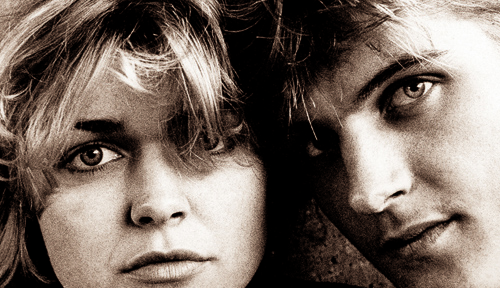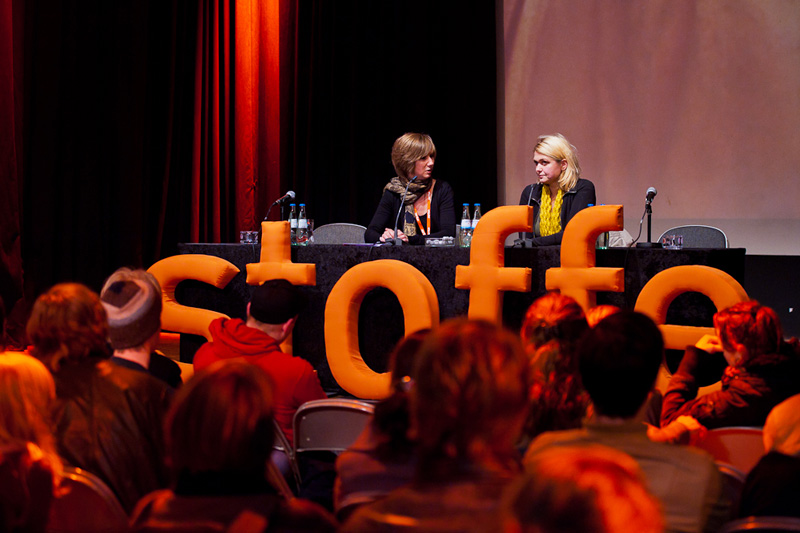AUDIENCE AWARD at International Woman´s Filmfestival // FESTIVALS: 35. Duisburger Filmwoche (Germany) / International Woman´s Filmfestival (Germany) / Hamburger Dokumentarfilmwoche (Germany) / Dok Film Woche Berlin (Germany) / International Woman´s Filmfestival 2012 (Germany) / DOCAVIV International Documentary Filmfestival Telaviv (Israel) / Internationales Filmfestival Assen (Netherlands) / 1° Festival de Cinema Independente Alemão (Brazil) / Guangzhou International Documentary Film Festival (China)
[german review below] FACEBOOK SALVE DIRK
© britta wandaogo
A film like a relapse. Or perhaps that’s not it? It’s rare that watching a film shakes me up so much, and even rarer that I ride on an emotional roller coaster at one of the Duisburger discussions. Is this woman up there on the podium, who just presented us with the life and death of her heroin-addicted brother, comforting herself? Is the film solace? I don’t know, what fascinates me more: the calm, clear and direct way Britta Wandaogo deals with the questions about her film, or the thought about what kind of development the woman has behind her, how she managed, not just to survive, but to do it at once inside and outside of the standards of her lower middle class background. At the end of the discussion, I am enraptured, more than before. And once again, I got pulled down a peg in my arrogance: One can obviously feel the world, not just classify it. The film is with words from outside even more difficult to get – than from the inside out, so beforehand Wandaogo’s own words:
My first video camera 1993. Dirk and I sit on the bed filming each other. I say to him: „I’m 27 years old and totally wasted, but first I will get my little brother back up!“ Whatever my plan was at this time, from this day on, I started filming reams of situations of us. Dirk, the exasperating centre of our family, that much has been said about. Dirk died, our family broke apart. But Dirk was my family. With him, I associated closeness and a humor that could maybe only be shared by brother and sister. His heroin addiction was a side effect – we both had to live with – always carried by the thought, he will get out of it somehow.
The material that Wandaogo had available were hours and hours of footage that she filmed – always more or less improvised – in the company of her brother. He loaded, or sleeping, waking up, charming, again and again charming, then again totally hopped up, incoherent and desperate. Britta Wandaogo sometimes in the images, filmed by him, classified by him as co-dependant, belittled and loved and used and positioned: material that trembles with excitement. Already the first scene bursts of symbolic power: Dirk drives ahead with the motorbike, somewhere in the South near a jungle, the sister climbs on the back, keeps holding the camera, a racing ride. And finally the bike is stuck in mud up over the hubcaps. Wandaogo becomes a mother, and so Dirk an uncle. The little girl loves the uncle; the no longer so little girl cries because the uncle once again occupies the room at Grandmother’s and afterwards it will need to be to be renovated. Believe in Miracles functions as a film like the punk version of Thomas Imbach’s Day is Done. The intimacy, the private, the all too personal becomes something that concerns, grabs, shakes and hurts me. Among other reasons, because at some point it no longer helps me to write off the addict as an idiot because it doesn’t work any more given his aura, his charm, his idiosyncratic interpretation of life. And this in turn works because the sister reveals it all, with care, with diligence, with a perfected skill and deliberate cinematographic editing. © Michael Sennhauser, Radio DRS2
My brother Dirk, the drug death
…… with our first recommendation, we will, however, go ahead a few days. The film is just too good. A love film. There is just no other way of calling Britta Wandaogo’s film, „Believe in Miracles“. For twelve years, she filmed while her brother was on drugs, while he was clean – and started all over again. Only seemigly an up and down because its actually clear: It’s always going downhill with Dirk. Yet Wandaogo’s collage, from her first hesitant camera tests, which the future film director shot in the beginning of the nineties, up to her challenging professional takes in 2005, the last year of her brother’s life, doesn’t tell us the story of a descent. Rather, it transmits the closeness and energy between the siblings to the audience, which provides an irresistible pull into the life of the two. One is for a short time by their side. With Britta, when she marries and has a child. And with Dirk, how he tries with all possible means to calm his greed for life and finds none that brings him peace. (…) At the end, one steps with Wandaogo’s camera through Dirk’s abandoned apartment, through a door, behind which a bloody-stained bathroom opens – and one feels an immediate loss. And so the film does leave us with an open and in its own way consoling question: Is a life truly wasted if it is lived as intensely as Dirk did? spiegel online | © Hannah Pilarczyk
Critical authenticity / TAZ … confronted with the disconcerting authenticity of Britta Wandaogo’s „Believe in Miracles“, essentially a private movie made public, for which the filmmaker accompanied her addicted brother Dirk over many years. Nowhere is the precarious observer position more explicit as in a scene in which the „protagonist“ must witness how his sister vomits while she is filming – he says she wouldn’t even realise, but maybe the filmmaker just didn’t want to forgo this take for anything. What plunges Britta Wandaogo into the crisis is the idea of a sober counterpart in documentary cinema. She is involved, is sometimes herself „high “, the margin of safety is slight. And the line to cross is constantly drawn by the protagonist Dirk, himself. In the end, that is what ultimately makes the one critical difference in documentary cinema: it is about life and death. BERT REBHANDL TAZ
Eine radikal persönlich – aus der Sicht der Filmemacherin – erzählte Familiengeschichte, für die sie über die Jahre mehrere Begegnungen mit ihrem drogenabhängigen Bruder Dirk filmte.
„Ein Film wie ein Rückfall. Oder stimmt das doch nicht? Es kommt selten vor, dass es mich so schüttelt im Kino, […] Ist der Film Trost? Ich weiss nicht, was mich mehr fasziniert: Die ruhige, klare und direkte Art, wie Britta Wandaogo mit den Fragen zu ihrem Film umgeht, oder der Gedanke daran, was die Frau für eine Entwicklung hinter sich hat, wie sie es geschafft hat, nicht nur zu überleben, sondern dies gleichzeitig innerhalb und außerhalb der kleinbürgerlichen Vorgaben ihrer Herkunft. Am Ende der Diskussion bin ich hingerissen, mehr als her. Und ich habe in meiner eigenen Arroganz wieder einmal einen Dämpfer erfahren: Man kann die Welt offensichtlich auch spüren, nicht nur klassifizieren. […] Das Material, das Wandaogo zur Verfügung hatte, waren Stunden um Stunden von Aufnahmen, die sie – immer mehr oder weniger aus der Hand heraus – in Gesellschaft ihres Bruders gedreht hatte. Er verladen, oder schlafend, aufwachend, charmant, immer wieder charmant, dann wieder völlig drauf, inkohärent und verzweifelt. Britta Wandaogo manchmal im Bild, von ihm gefilmt, als Co-Abhängige von ihm klassifiziert, herabgesetzt und geliebt und ausgenutzt und aufgestellt: Material, das vor Spannung bebt. Schon die ersten Einstellungen platzen von Symbolkraft: Dirk fährt mit dem Motorrad vor, irgendwo im Süden in Dschungelnähe, die Schwester steigt hinten auf, hält immer weiter die Kamera, rasante Fahrt. Und schließlich bleibt das Motorrad im Schlamm stecken bis über die Naben.
Michael Sennhauser Filmkritiker SWR www.sennhausersfilmblog.ch
Liebesfilm. Anders kann man Britta Wandaogos „Nichts für die Ewigkeit“ nicht nennen. Zwölf Jahre lang hat sie gedreht, wenn ihr Bruder Dirk auf Droge war, er runterkam – und wieder von vorn anfing. Nur scheinbar ein stetes Auf und Ab, denn eigentlich ist klar: Es geht immer weiter bergab mit Dirk. Doch Wandaogos Collage aus ersten, zögerlichen Kameratests, die die angehende Regisseurin Anfang der Neunziger unternimmt, bis hin zu ihren fordernden Profi-Aufnahmen, die 2005, im letzten Lebensjahr des Bruders, entstehen, erzählt nicht die Geschichte eines Abstiegs. Vielmehr überträgt sich die Nähe und Energie zwischen den Geschwistern auf den Zuschauer und sorgt für einen unwiderstehlichen Sog in das Leben der zwei. […] Zum Schluss schreitet man mit Wandaogos Kamera durch Dirks verlassene Wohnung, durch eine Tür, hinter der sich ein blutverschmiertes Badezimmer auftut – und man spürt einen unmittelbaren Verlust. Und doch hinterlässt der Film eine offene, auf ihre Art tröstliche Frage: Ist ein Leben wirklich vergeudet, wenn man es so intensiv lebt, wie es Dirk getan hat? Hannah Pilarczyk Spiegel Online www.spiegelonline.de
Diskussionsprotokoll No. 15 Nichts für die Ewigkeit Donnerstag, 10. November 2011 35. DUISBURGER FILMWOCHE
Podium: Britta Wandaogo (Regie) Andrea Reiter (Moderation)
„Ein bewegender Film!“ – „Extrem intensiv!“ – „Wahnsinnig dicht!“ Duisburg legte Britta Wandaogo sein Herz zu Füßen. Wandaogo kehrt wie in den meisten ihrer anderen Arbeiten auch in NICHTS FÜR DIE EWIGKEIT das Private radikal nach außen. Zwischen 1993 und 2005 hat sie immer wieder sich und ihren Bruder Dirk gefilmt. Die Kamera war ein selbstverständlicher Teil der Kommunikation zwischen den beiden Geschwistern. Das erklärt die große Unbefangenheit, diese bemerkenswerte Freiheit im Agieren vor und Spielen mit der Kamera, die das Material auszeichnet.
Der Film ist zweierlei: Das Dokument einer „geschwisterlichen Freundschaft, gar Liebe“ (Andrea Reiter) und eines, das die kontinuierliche Selbstzerstörung einer geliebten Person zeigt. Dirk ist heroinabhängig. Seine Drogentrips und Entzugserscheinungen nehmen einen breiten Raum im Film ein. Wandaogo spart nichts aus. Dirk hat häufig einen Affen und macht sich noch häufiger selbst zum Affen. Ein Junkie, der „die ganze Zeit seinen Körper am Laufen halten muss“ (Wandaogo). Der Vater, wie die Mutter völlig überfordert mit der Situation, führt Buch über die Versprechen des Sohnes, endlich clean zu werden, und darüber, wie er sie permanent bricht. Ein schon fast rührender Versuch, Ordnung ins Chaos zu bringen. Ob sie den Film schon ihren Eltern gezeigt habe, wurde Wandaogo gefragt. Nein, antwortete sie, wahrscheinlich werde sie das auch nicht tun. Die Reaktion der Mutter sei vorhersehbar: Dirk würde bloßgestellt. Doch wird er das nicht auch? „Wandaogo benutzt den Bruder nicht als Effekt im Dramaturgischen“, sagte Werner Ružička, als wolle er jedem möglichen Unbehagen über das Verfahren der bedingungslosen Offenheit einen Deckel aufsetzen. Es sei schwer, über NICHTS FÜR DIE EWIGKEIT zu reden, räumte er ein. Man müsse zugleich über seine persönliche Anteilnahme an dem Geschehen sprechen und über den Film als Film.
CREDITS
camera brittta wandaogo, piet fuchs
soundediting claas berger
colour correction ramin khadjaviha


